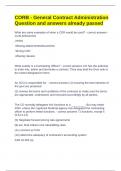Do cognitive processes bias how we perceive the world?
(Critical evaluation)
An open and dynamic relationship with the physical and social world around us is the foundation
of both our intellectual and emotional development. By getting to know the environment, we
shape the world around us while we ourselves adapt to this world. The first step in cognitive
processes is the perception of environmental stimuli. Perception and sensation are examined by
psychology as separate processes although the two processes are closely intertwined. Perception
is the integration of the senses, in which adaptation to the environment is characterized by
realistic processing of stimuli. However, there are processing biases and the human brain is
powerful but it is subject to limitations. Cognitive biases are often a result of the brain's attempt
to simplify information processing. Some of these distortions are related to memory, while others
might be related to problems with attention. Nevertheless, both processing methods - realistic
and biased - serve adaptation well. The aim of this study is to provide an integrated critical
evaluation of relevant theories from different psychological perspectives that argues cognitive
processes do bias our perceptions of the world.
People develop knowledge of something on prior exposure to similar experiences or other
knowledge bases which enables them to develop biased perception. Bartlett (1932) cited in
Lazard (2015, p. 336) attributes the development of schemas to top-down memory processes as
schema theory starts from observable changes in memory. Based on these observations, as an
explanation for memory “errors,” Bartlett suggested that memory is constructive / reconstructive
in nature, therefore in the course of remembrance, events are not simply repeated (reproduced) -
instead, they are recreated. (The Open University, 2015, p. 336-337). This suggests that
assumptions of specific situations, events, people’s personality traits and social roles require
general knowledge and are socially shared (i.e. same interpretation in a given society), however,
constructing schemas may not need personal experience as it may be linked to cognitive
(memory) processes. One of the main features of schemas is that they make the world more
predictable, however, on the other hand, this can be misleading. Darley and Gross’ study (1983)
cited in Lazard (2015, p. 339) revealed that pre-existing schemas of certain characteristics or
roles can become associated with social markers (i.e. race, role), which may lead to stereotyping.
This suggests schemas can not only help with memory but can also distort memories. The
schema is thus a construct based on generalization. Also carries expectations that may result in
modifications and distortions in the original perception and subsequent recall, for example, the
imagination can enrich the original scene with schema elements, which often gives a real but
misleading impression.
(Critical evaluation)
An open and dynamic relationship with the physical and social world around us is the foundation
of both our intellectual and emotional development. By getting to know the environment, we
shape the world around us while we ourselves adapt to this world. The first step in cognitive
processes is the perception of environmental stimuli. Perception and sensation are examined by
psychology as separate processes although the two processes are closely intertwined. Perception
is the integration of the senses, in which adaptation to the environment is characterized by
realistic processing of stimuli. However, there are processing biases and the human brain is
powerful but it is subject to limitations. Cognitive biases are often a result of the brain's attempt
to simplify information processing. Some of these distortions are related to memory, while others
might be related to problems with attention. Nevertheless, both processing methods - realistic
and biased - serve adaptation well. The aim of this study is to provide an integrated critical
evaluation of relevant theories from different psychological perspectives that argues cognitive
processes do bias our perceptions of the world.
People develop knowledge of something on prior exposure to similar experiences or other
knowledge bases which enables them to develop biased perception. Bartlett (1932) cited in
Lazard (2015, p. 336) attributes the development of schemas to top-down memory processes as
schema theory starts from observable changes in memory. Based on these observations, as an
explanation for memory “errors,” Bartlett suggested that memory is constructive / reconstructive
in nature, therefore in the course of remembrance, events are not simply repeated (reproduced) -
instead, they are recreated. (The Open University, 2015, p. 336-337). This suggests that
assumptions of specific situations, events, people’s personality traits and social roles require
general knowledge and are socially shared (i.e. same interpretation in a given society), however,
constructing schemas may not need personal experience as it may be linked to cognitive
(memory) processes. One of the main features of schemas is that they make the world more
predictable, however, on the other hand, this can be misleading. Darley and Gross’ study (1983)
cited in Lazard (2015, p. 339) revealed that pre-existing schemas of certain characteristics or
roles can become associated with social markers (i.e. race, role), which may lead to stereotyping.
This suggests schemas can not only help with memory but can also distort memories. The
schema is thus a construct based on generalization. Also carries expectations that may result in
modifications and distortions in the original perception and subsequent recall, for example, the
imagination can enrich the original scene with schema elements, which often gives a real but
misleading impression.


